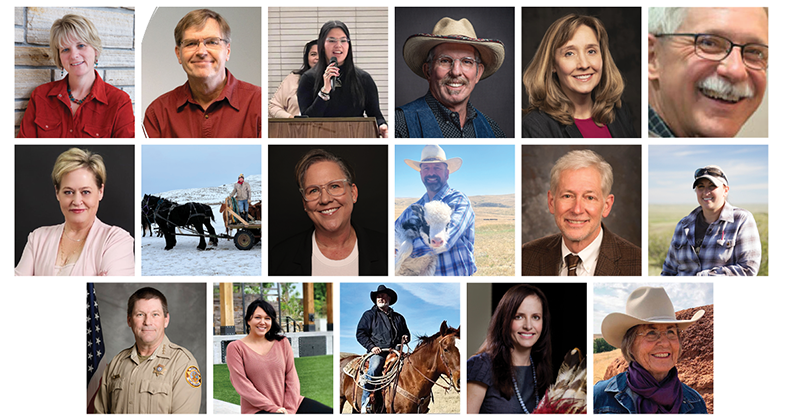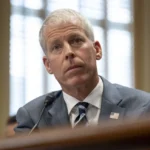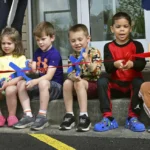The Lifelong Lessons of Work: Prominent Wyomingites Reflect on their First Jobs
- Published In: Other News & Features
- Last Updated: Sep 04, 2023

A first job is a rite of passage—and an opportunity to pick up a new skill and develop a work ethic while pocketing some cash. In honor of Labor Day, the Wyoming Truth asked prominent Wyomingites about the lessons they learned on their first jobs that they still bring to their work decades later.
–Cynthia Hanson, Editor
Cindy DeLancey, president of the Wyoming Business Alliance and the Wyoming Heritage Foundation, on her first job at age 13 at David’s Cookies in Port Jefferson, New York: “Being young, I only worked a couple hours a day on the weekends. I helped bake cookies and helped customers. That experience in the hospitality industry, at such a young age, really helped me understand how important good customer service is. That’s a lesson that has followed me my entire life, to really understand the importance of doing what you say, following through, not over-committing or under-delivering.”
Scot Rendall, Sheridan director of IMPACT 307, on his first job at age 16 on a home renovation project: “My father and uncle took on a project to remodel a friend’s house. It was weekend work, and as I recall, they were very full, long days [for] $2/hour. We’d leave home both Saturday and Sunday around 6:30 a.m., drive 45 minutes to the job site and work until 5 or 5:30 p.m., before departing for a 45-minute return home. The friend kept adding rooms to remodel, so it lasted several months. I did demolition of drywall and masonry, and breathed in a lifetime worth of construction dust. I developed a work ethic, which I’ve carried on throughout my career. This job also came with the added incentive of ensuring that I finish school for a career in accounting and finance . . . .”
Christie Wildcat, senior office associate for the University of Wyoming’s Native American Education, Research and Cultural Center, on her first job as a kennel technician at Paws for Life Animal League while growing up: “I was able to care for the shelter animals and even adopt six of the animals into my family. I learned how to roll with the day, as no day was truly the same. I also learned how to care for animals beyond basic needs, treat them with medication and diagnose simple needs. I also learned to work with people to find their perfect fit of their furry best friend, along with networking when it came to showcases of the shelter. Overall, working at the shelter helped me be more in touch with compassion and to spread that in everyday life. The lessons I’ve learned have [impacted] my current professional life by giving me the key skills to learn quickly on the job if need be…. Most importantly, I’ve learned to pass on the compassion from helping the animals to helping students in what they need in their academic endeavors.”
Jefferson Glass, author of “RESHAW: The Life and Times of John Baptiste Richard” and “EMPIRE: The Pioneer Legacy of an American Ranch Family,” on his first job at age 14 working on a small-scale ranch in Oregon: “I did a little bit of everything. I irrigated the hay fields, built fences and a corral, bucked hay…you name it. There were no specific paydays nor rate of pay. Every few weeks, I would hit the boss up, and he would look in his little notebook and list everything I had done since the last time he paid me. Then he would hand me some cash and say, ‘That looks about right,’ then write it down in the little notebook. Sometimes it seemed generous; other times it seemed like lots of work for a little pay. I worked for him for two years. I learned that what I earned was based on the value of the finished product, not necessarily how difficult the job was. I don’t remember ever questioning his judgement.”
Lisa Watson, president of Northwest College, on her first job working in a machine shop: “The job was with a friend’s dad [owner], and I was thankful he took a chance on a girl with no experience. I was young and immature, and thankfully, the owner gave me grace and some tough love so I could learn how to be a good employee. The job itself was fantastic! CNCs, lathes and presses of all types. Music playing, fresh air, aluminum shavings and machine oil tickled the senses. I learned much about production, pride in craftsmanship, world-class quality and teamwork.”
Ranchester Mayor Peter Clark on his first job delivering flowers on Mother’s Day at age 13 or 14 while working for a family friend’s greenhouse. He stayed on at the greenhouse as an agricultural laborer through high school: “They hired me for a dollar an hour to be a runner. Someone else would drive to the location, and my job was to run the flowers up to the door. … What it did was prepare me to actually do a job, even if it was tedious like raking, cleaning flowers or just simple labor. By the time I went to college, I knew how to work.”
Susan Carr, executive director of the Community Services Network of Wyoming, on her first job at age 14 at her family’s diner, The Nugget Cafe, in Lead, South Dakota: “I started off busing and washing dishes, as all my siblings did. I worked my way up to being a waitress. My first customer ordered a hamburger and a cup of ham and bean soup and left me a 50 cent piece for my tip. I was hooked! [My dad] held the highest expectations [for] us. … My dad also taught me the importance of appreciating your staff and team. He always said that he couldn’t run the business without them. Every day, without fail, before he went home for the day, he went to each person working that day and said ‘Thank you.’ When it was my turn to be in a leadership position … I realized what my dad had done was uncommon and unique. He believed his role as a business owner was to give his team all the tools to be successful—and then get out of their way. Let them shine. Let them grow. I’ve carried that philosophy with me for over 30 years of being in leadership positions.”
Ea’mon O’Toole, co-owner of Ladder Livestock Company, on his first job out of college working at his family ranch: “I lived in a sheep wagon north of Dixon, Wyoming, calving out cows and moving them around for three months. Living in a sheep camp was a unique experience in that the day-to-day life is very quiet. The best part was learning that everything that gets done is because you are the person doing it. There is no one to cut firewood but yourself. There is only food to eat if you are the one cooking it. The work was the same kind of work as I had done growing up on the ranch. Feeding with a tractor and checking cows and calves on horseback was the normal day-to-day job. Managing predators and pasture use was always in the back of my mind. After calving and branding [were] over, we trailed the cattle to the forest for the summer. Once the cattle were in the forest, I was back living at the headquarters of the ranch. While at the ranch, [there was] a Spanish-speaking cowboy that I rode and fixed fences with every day. This is where I learned to speak Spanish. I would talk to my family in the mornings and evenings in English, but all day it was Spanish. I learned to be self-sufficient and self-motivated living alone and having a job that mattered. If I didn’t check [livestock] and feed them, no one was coming to do it later. As my grandfather, George Salisbury, said, ‘Everyone should live in a sheep camp for three years. It teaches you patience and perseverance.’”
Heather Babbitt, deputy director of the Wyoming Department of Corrections, on her first job as a lifeguard during high school: “I worked every summer at the same pool from the age of 16 to 20. It was a great job. Lessons I learned included how important it is to show up. When you don’t show up, someone else has to pick up the slack, and that’s no way to treat your coworkers. I learned responsibility. People expected we would help keep their kids safe, and I took that seriously. And I learned you put in the work, and you get paid. And that is very empowering. Earning a paycheck gave me a great sense of independence, even at 16. All of these traits have helped me in my almost 30 years with the State of Wyoming, especially in my current role. No matter what job you do or how old you are, people are counting on you to show up, be a team player and take your job seriously.”
Sen. Eric Barlow (R-Gillette), a member of the Labor, Health and Social Services Committee, on his first job working on his family’s ranch:
“My first ‘job,’ in the classical sense of a regular paycheck and even benefits, began September 9, 1984, as a recruit and then upon graduation, a United States Marine. For the next four years I learned a variety of service-related skills and had adventures in several parts of this great country. However, that isn’t where the job sequence really started, because I grew up on a ranch and doing your part was part and parcel. Whether it be milking the cow, cleaning the chicken house, fencing, spraying weeds, checking water for the livestock or helping the neighbor, these were the first chores, tasks or jobs I had. This is what the generations before us had done, and it was our turn. I recall it felt a bit burdensome at times, but in hindsight it has given me such an appreciation for responsibility, heritage and the value of taking on a task and seeing the fruits of its completion. I couldn’t be more blessed for having it.”
Ed Seidel, president of the University of Wyoming, on his first job working in the hospitality industry: “I worked at the Yankee Drover Inn, a historic inn and restaurant in Newtown, Connecticut. I learned an appreciation for the hospitality and tourism industry, as well as the value of hard work. In the tourism and hospitality industry, you have to hustle to serve your customer. As president of the University of Wyoming, I have kept that drive to ensure that I am meeting the needs of those I serve – primarily, our students and the people of Wyoming.”
Kendall Roberts, co-owner and operator of King Ranch Company, on her first job at the family ranch: “I worked every day after high school if I wasn’t in sports or at FFA events and on the weekends and holiday school breaks. I saved my money to buy my first set of cows, first pickup truck, and had money in my pocket I earned in order to go out with friends on free nights. The lessons it taught me were time management, reliability, dependability and responsibility for the job and in life… otherwise livestock losses could occur, someone could get physically hurt or a task wouldn’t get completed before we would have to move onto something else. Hard work and dedication then taught me that I could work through more education, such as my college degrees, internships and other outside ranch jobs I had prior to now. This ‘job’ then turned into a career and lifestyle. I live and work on the same ranch, provide a home for my family and provide a delicious product with honesty and integrity. I remember the importance of the food I grow, beef cattle, and how it provides food for someone else’s table. If I didn’t continue to use these skills or have a passion for agriculture, one person would go without a burger [on] their BBQ weekend, a steak at a family dinner, a prime rib for holiday feasts or a meal in general.”
Scott Steward, former Park County sheriff and current county commissioner, on his first job at age 12: “I went to work for this Mini Paper [a free ad-supported paper]. … You used to go and you’d lay them on the doorsteps or wherever … One day, it was raining, I was tired and about halfway through my route, I was getting drenched … So I took all the papers and threw them in a garbage can instead of finishing my route. … When I came in the next Wednesday or whatever it was, she [the boss] was like, ‘Did you deliver all your papers last week?’ And I was like, ‘Uh … yeah.’ She goes, ‘Are you sure? Because … somebody reported these all in this trash can.’ And I go, ‘No.’ They already had my check ready … and I was fired. So what I learned is honesty and [to do] my job and not be lazy.”
Desirée Tinoco, executive director of Missing People of Wyoming, on her first job at age 15 at a tattoo shop in Hardin, Montana: “My boss was not only an amazing award-winning tattoo artist, but also a professional wrestler. She took me under her wing and lovingly referred to me as ‘Tinker Bell.’ I started out as an apprentice and eventually became a piercer. Some of the most important lessons I learned while working there is that ink therapy is a real thing, and you never know what someone is going through at any given time. Being the calm in the storm, reassuring them and explaining the process can help tremendously, which has carried through to my work today helping families of the missing.”
Mark Eisele, Cheyenne rancher and president-elect of the National Cattlemen’s Beef Association, on his first job off the family ranch, when he worked construction on a highway project as a teenager: “Driving a big truck on the job seemed like easy work, but the days seemed longer and longer, and the work seemed boring. I realized I loved the ranch and the variety it offered to me every day. I decided to throw myself wholeheartedly into that. I still enjoy it and have met amazing people and seen amazing places. I was also motivated to finish my college education. That might not have happened had I stayed with the construction work.”
Rebecca West, executive director and CEO of the Buffalo Bill Center of the West in Cody on her first job in her family’s business: “Back in about 1980, I had what I thought was a real job—outside of the house and chores—polishing brass doorknobs on the old Victorian houses owned by my family’s Pittsburgh rental business. There were quite a few, and it sounded great at first, satisfying and easy. Until I realized that once I got done, they’d all be tarnished again.”
Mary Flitner, Shell rancher, memoirist and 2023 Wyoming Cowboy Hall of Fame inductee on her first job off her family’s ranch: “We always worked on the ranch, but when we got to high school, our dad thought we should take a job. So I worked at a local drug store with a soda fountain, and then I worked for a petroleum company. It was a good experience to do some work off the ranch, where people had more formal expectations. The drug store was fun and easy by my standards. But for the petroleum company, I had to type 11 copies of drilling reports every day with carbon paper. It was awful! It was so many numbers, and you couldn’t make any mistakes. And if you made a mistake, you had to go back and correct all the copies. I learned I didn’t want a clerical job for the rest of my life, and don’t make mistakes. They’re too hard to correct.”
CJ Baker, Carrie Haderlie, Jennifer Kocher, Ruffin Prevost and Shen Wu Tan contributed to this report.













